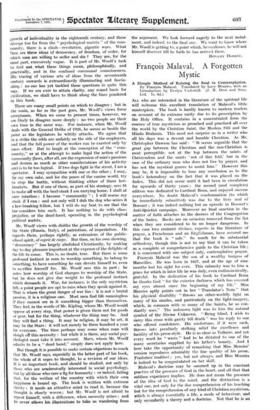Francois Malaval. A Forgotten Mystic ALL who are interested in
the literature of the spiritual life will welcome this excellent translation of Malaval's little masterpiece. The book is hardly known to modern readers on account of its extreme rarity due to its proscription by the Holy Office. It contains in a concentrated form the essence of true mysticism as preached and practised all over the world by the Christian Saint, the Moslem Safi and the Hindu Brahmin. This need not surprise us in a writer who all his days was a devout and humble Christian. As Mr. Christopher Dawson has said : " It seems arguable that the great gap between the Christian and the non-Christian is most perceptible, not at the top between the saints of Christendom and the saints not of this fold,' but in the case of the ordinary man who does not live by prayer, and has not the mystical graces to assist him." However this may be, it is impossible to base any conclusion as to the book's heterodoxy on .the fact that it was placed on the Index. This did not occur until it had been in circulation for upwards of thirty years ; the second (and complete) edition was dedicated to Cardinal Bona, and enjoyed success everywhere. No doubt Malaval's condemnation (to which he . immediately submitted) was due to the fiery zeal of Bossuet ; it was indeed nothing but an episode in Bossuet's Anti-Quietist campaign. Moreover no final sanction in the matter of faith attaches to the decrees of the Congregation of the Index. Books are on occasion removed from the list when they are considered to be no longer dangerous. In this case two eminent divines, experts in the literature of prayer, a Frenchman and an Englighman, have assured me that the book is " safe." So much for its substantial orthodoxy, though this is not to say that it can be taken as a complete or comprehensive guide to the Christian life ; it is concerned with one subject only, contemplative prayer.
Francois Malaval was the son of a wealthy burgess of Marseilles. He was born in 1027, and at the age of nine months lost his sight for ever. This calamity was to him a grace for which in later life he was duly, even enthusiastically, grateful. In the dedication of his book to Cardinal Bona he thanks God " for the exterior darkness which has covered my eyes almost since the beginning of my life." Miss Menzies aptly points out in her " Translator's Note " that his physical disability " throws an other-worldly light on many of his similes, and particularly on the light-imagery, which, in common with so many of the Saints, he so con- stantly uses." The unknown light was to hini the natural symbol of the-Divine Unknown. " Being blind, I wish to carry this cross with gaiety till death " was his reply to one who offered condolence. His misfortune, if it were such, throws into peculiarly striking relief the excellence and lucidity of his prose-style. He is as clear as Voltaire, and yet every word he " wrote " had to be dictated to one of the many secretaries supplied by his father's bounty. And I here take the opportunity of remarking that Miss Menzies' version reproduces admirably the -fine quality of his prose. Traduttori traditori ; yes, but not always, and Miss Menzies is indeed to be congratulated on her skill.
Malaval's doctrine may be summed up in the constant practice of the presence of God in the heart, and all that that sublime experience implies. He does not mean the presence of the idea of God to the mind, and the distinction is a vital one, not only for the due comprehension of his teaching but for the comprehension of any kind of Christian mysticism, which is always essentially a life, a mode of behaviour, and only secondarily a theory and a doctrine. Not that he is-an
anti-intellectualist in any sense of the word. He offers a philosophical defence of the prayer of faith, which leaps to a :veiled apprehension of God's understanding of His own Attributes, in terms of the purest Thomism.
In spite of the habitual retirement which he cultivated, he was sociable and fond of the society of young people, whom he used to take into his house and educate in return for their services- as secretaries. He kept in touch with the scholars of the day, taking great interest in scientific problems, and was one of the founders of the Academy of Marseilles. He had many friends, among ;them; oddly enough, that astonishing Queen and character, Christina of Sweden. He lived to be very-old, dying at the age of 92. -
Miss Evelyn Underhill has contributed to this book a sound theological and historical introduction in which she discusses with great penetration the orthodoxy of Malaval's teaching. She defends it quite successfully. .
ALGAR THOROLD.















































 Previous page
Previous page